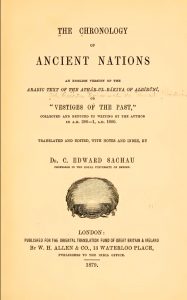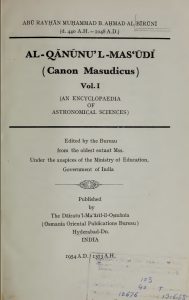NOWRUZ. ON THE FESTIVALS IN THE MONTHS OF THE PERSIANS. (Farwardîn-Mâh.)
febrero 2022
Al-Birūni, Abū ‘R-Raihān Muhammad Ibn Ahmad al-Bīrūnī (in Arabic: أبو الريحان البيروني; in Persian: ابوریحان بیرونی) collects various traditions about the origin of Nowruz festival in his books Asar al-Bagiah and Al- Qanunal-Masoudi (in the latter, in particular, he explains the methods for fixing Nowruz date and calendar calculation).
We collect here the translation of Asar Al-Bagiah into English from Arabic, by C. Edward Sachau and published in London in 1879.
ON THE FESTIVALS IN THE MONTHS OF THE PERSIANS. (Farwardîn-Mâh.)
(1. Naurôz.)
. . . and he divided the cup among his companions, and said, “O that we had Naurôz every day!”
A philosopher of the Ḥashwiyya-school relates that when Solomon the son of David had lost his seal and his empire, but was reinstated after forty days, he at once regained his former majesty, the princes came before him, and the birds were busy in his service. Then the Persians said, “Naurôz âmadh,” i.e. the new day has come. Therefore that day was called Naurôz. Solomon ordered the wind to carry him, and so it did. Then a swallow met him, and said, “O king, I have got a nest with little eggs in it. Please, turn aside and do not smash them.” So Solomon did, and when he again descended to earth the swallow came bringing some water in his beak, which he sprinkled before the king, and made him a present of the foot of a locust. This is the cause of the water-sprinkling and of the presents on Naurôz.
Persian scholars say that in the day of Naurôz there is an hour in which the sphere of Fîrôz is driven on by the spirits for the purpose of renovating the creation.
The happiest hours of this day are the hours of the sun. On its morning, dawn is the shortest possible, and it is considered as a good omen to look at this dawn. It is a “preferable” day because it is called Hurmuz, which is the name of God who has created, formed, produced, and reared the world and its inhabitants, of whose kindness and charity nobody could describe even a part.

Sa’îd b. Alfaḍl relates : On the mountain Damâ in Pârs every night of Naurôz there is observed a far-spreading and strong-shining lightning, whether the sky be clear or covered with clouds, in every state of the weather.
Still more curious than this are the fires of Kalwâdhâ, although one does not feel inclined to believe the thing without having seen it. ‘Abû-alfaraj Alzanjâni, the mathematician, told me that he had witnessed it together with a number of other people who went to Kalwâdhâ in that year when ‘Adud-aldaula entered Baghdâdh, and that there are innumerable fires and lights which appear on the west side of the Tigris, opposite Kalwâdhâ, in that night with the morning of which Naurôz begins. The Sulṭân had there posted his guards to find out the truth in order not to be deceived by the Magians. All, however, they found out was this, that as soon as they came nearer to the fires they went farther off, and as soon as they went away the fires came nearer. Now I said to Abû-Alfaraj, ” The day of Naurôz recedes from its proper place in consequence of the Persians neglecting intercalation. Why, then, does not this phenomenon remain back behind Naurôz ? Or if it is not necessary that it should remain behind, did it then fall earlier at the time when they practised intercalation?” Upon which he could not give a satisfactory answer.
The charm-mongers say : He who thrice sips honey on Naurôz in the morning before speaking, and perfumes his room with three pieces of wax, will be safe against all diseases.
One Persian scholar adduces as the reason why this day was called Naurôz, the following: viz. that the Șâbians arose during the reign of Tahmûrath. When, then, Jamshîd succeeded, he renovated the religion, and his work, the date of which was a Naurôz, was called New-Day. Then it was made a feast day, having already before been held in great veneration.
Another account of the reason why it was made’ a feast day is this, that Jamshîd, on having obtained the carriage, ascended it on this day, and the Jinns and Dêws carried him in one day through the air from Dabâwand to Babel. Now people made this day a feast day on account of the wonder which they had seen during it, and they amused themselves with swinging in order to imitate Jamshîd.
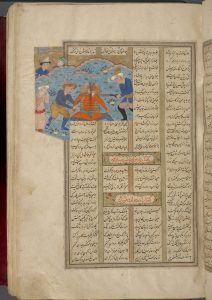 Another report says that Jam was going about in the country,—that he, when wishing to enter Âdharbaijân, sat on a golden throne and was thus carried away by the men on their necks. When, then, the rays of the sun fell on him and people saw him, they did homage to him and were full of joy and made that day a feast day.
Another report says that Jam was going about in the country,—that he, when wishing to enter Âdharbaijân, sat on a golden throne and was thus carried away by the men on their necks. When, then, the rays of the sun fell on him and people saw him, they did homage to him and were full of joy and made that day a feast day.
On Naurôz it was the custom for people to present each other sugar. According to Âdharbâdh, the Mautabh of Baghdâdh, the reason is this, that the sugar-cane was first discovered during the reign of Jam on the day of Naurôz, having before been unknown. For Jam on seeing a juicy cane which dropped some of its juice, tasted it, and found that it had an agreeable sweetness. Then he ordered the juice of the sugarcane to be pressed out and sugar to be made thereof. It was ready on the fifth day, and then they made each other presents of sugar. The same was also the custom on Mihrjân.
They have adopted the time of the summer-solstice as the beginning of the year for this reason in particular, that the two solstitial-points are easier to be ascertained by the help of instruments and by observation than the equinoctial points, for the former are the beginning of the advance of the sun towards one of the two poles of the universe and of his turning away from the same pole. And if the perpendicular shadow at the summer-solstice is observed, and the level shadow at the winter-solstice, in whatsoever place of the earth the observation be made, the observer cannot possibly mistake the day of the solstice, though he may be entirely ignorant in geometry and astronomy, because a variation of the level shadow takes place notwithstanding the small amount of declination, if the Height is considerable. On the other hand the two equinoctial days cannot be ascertained, unless you have found beforehand the latitude of the place and the General Declination. And this nobody will find out unless he studies astronomy and has profited something thereby, and knows how to place and how to use the instruments of observation.
Therefore the solstitial points are better adapted for marking the beginning of the year than the equinoctial points. And as the summer-solstice is nearer to the zenith of the northern countries, people preferred it to the winter-solstice; for this reason, moreover, that it is the time of the ripening of the corn. Therefore it is more proper to gather the taxes at this time than at any other.
Many of the scholars and sages of the Greeks observed the horoscope at the time of the rising of Sirius and commenced the year at that time, not with the vernal equinox, because the rising of Sirius coincided in bygone times with this solstice, or occurred very near it.
This day, I mean Naurôz, has receded from its original proper place, so that in our time it coincides with the sun’s entering the sign of Aries, which is the beginning of spring. Whence it has become the custom of the princes of Khurâsân on this day to dress their warriors in spring —and summer— dresses.
On the 6th of Farwardîn, the day Khurdâdh, is the Great Naurôz, for the Persians a feast of great importance. On this day—they say— God finished the creation, for it is the last of the six days, mentioned before. On this God created Saturn, therefore its most lucky hours are those of Saturn. On the same day—they say—the Sors Zarathustrœ came to hold communion with God, and Kaikhusrau ascended into the air. On the same day the happy lots are distributed among the people of the earth. Therefore the Persians call it “the day of hope.”
The charm-mongers say : He who tastes sugar on the morning of this day before speaking, and anoints himself with oil, will keep off all sorts of mishap during the greater part of this same year.
On the morning of this day, a silent person with a bundle of fragrant flowers in his hand is seen on the mountain Bûshanj; he is visible for one hour and then disappears, and does not reappear until the same time of the next year.
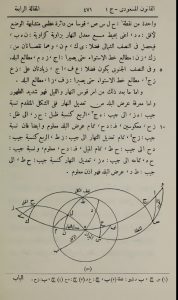 Zâdawaihi says that the cause of this was the rising of the sun from the southern region, i.e. Afâhtar. For the cursed ‘Iblîs had deprived eating and drinking of their beneficial effect, so that people could not satisfy their hunger nor quench their thirst; and he had prevented the wind from blowing. So the trees withered up and the world was near to utter decay. Then came—by the command and under the guidance of God— Jam to the southern region. He marched towards the residence of ‘Iblîs and of his followers, and remained there for some time until he had extinguished that plague. Then people returned into a state of justice and prosperity and were freed from that trial. Under such circumstances Jam returned to the world (i.e. Eran) and rose on that day like the sun, the light beaming forth from him, as though he shone like the sun. Now people were astonished at the rising of two suns, and all dried-up wood became green. So people said rôz-i-nau, i.e. a new day. And everybody planted barley in a vessel or somewhere else, considering it as a good omen. Ever since, it has been the custom on this day to sow around a plate seven kinds of grain on seven columns, and from their growth they drew conclusions regarding the corn of that year, whether it would be good or bad.
Zâdawaihi says that the cause of this was the rising of the sun from the southern region, i.e. Afâhtar. For the cursed ‘Iblîs had deprived eating and drinking of their beneficial effect, so that people could not satisfy their hunger nor quench their thirst; and he had prevented the wind from blowing. So the trees withered up and the world was near to utter decay. Then came—by the command and under the guidance of God— Jam to the southern region. He marched towards the residence of ‘Iblîs and of his followers, and remained there for some time until he had extinguished that plague. Then people returned into a state of justice and prosperity and were freed from that trial. Under such circumstances Jam returned to the world (i.e. Eran) and rose on that day like the sun, the light beaming forth from him, as though he shone like the sun. Now people were astonished at the rising of two suns, and all dried-up wood became green. So people said rôz-i-nau, i.e. a new day. And everybody planted barley in a vessel or somewhere else, considering it as a good omen. Ever since, it has been the custom on this day to sow around a plate seven kinds of grain on seven columns, and from their growth they drew conclusions regarding the corn of that year, whether it would be good or bad.
On the same day Jamshîd issued a proclamation to those who were present, and wrote to those who were absent, ordering them to destroy the old temples and not to build a new one on that day.
His behaviour towards the people was such as pleased God, who rewarded him by delivering his people from diseases and decrepitude, from envy and frailty, and sorrows and disasters. No being was sick or died, as long as he ruled—until the time when Bêwarasp, his sister’s son, appeared, who killed Jam and subdued his realm. In the time of Jam the population increased at such a rate that the earth could no longer contain them; therefore God made the earth thrice as large as it had been before. He (Jam) ordered people to wash themselves with water in order to clean themselves of their sins, and to do so every year that God might keep them aloof from the calamities of the year.
Some people maintain that Jam ordered channels to be dug, and that the water was led into them on this day. Therefore people rejoiced at their prosperity, and washed themselves in the water that was sent them (by the channels), and in this respect the later generations have considered it a good omen to imitate the former ones.
Others, again, maintain that he who let the water into the channels was Zû, after Afrâsiâb had ruined all the dwellings of Erânshahr.
According to another view, the cause of the washing is this—that this day is sacred to Harûdhâ, the angel of the water, who stands in relation to the water. Therefore people rose on this day early, at the rising of dawn, and went to the water of the aqueducts and wells. Frequently, too, they drew running water in a vase, and poured it over themselves, considering this a good omen and a means to keep off hurt.
On the same day people sprinkle water over each other, of which the cause is said to be the same as that of the washing. According to another report, the reason was this—that during a long time the rain was withheld from Erânshahr, but that they got copious rain, when Jamshîd, having ascended the throne, brought them the good news of which we have spoken. Therefore they considered the rain a good omen, and poured it over each other, which has remained among them as a custom.
According to another explanation, this water-sprinkling simply holds the place of a purification, by which people cleansed their bodies from the smoke of the fire and from the dirt connected with attending to the fires. Besides it serves the purpose of removing from the air that corruption which produces epidemic and other diseases.
On the same day Jam brought forward all kinds of measures ; therefore the kings considered his way of counting as of good omen. On the same day they used to prepare all the necessary paper and the hides on which their despatches to the provinces of the empire were written, and all the documents to which the royal seal was to be applied were sealed. Such a document was called Espîdânuwisht.
After the time of Jam the kings made this whole month, i.e. Farwardîn-Mâh, one festival, distributed over its six parts. The first five days were feast days for the princes, the second for the nobility, the third for the servants of the princes, the fourth for their clients, the fifth for the people, and the sixth for the herdsmen.
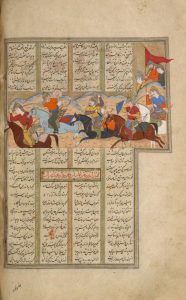 The man who connected the two Naurôz with each other is said to have been Hormuz ben Shâpûr the Hero, for he raised to festivals all the days between the two Naurôz. Besides he ordered fires to be kindled on high places, because he considered it a good omen, and for the purpose of purifying the air, since they consume all unwholesome elements in the air and dissolve and scatter those miasmata that produce corruption.
The man who connected the two Naurôz with each other is said to have been Hormuz ben Shâpûr the Hero, for he raised to festivals all the days between the two Naurôz. Besides he ordered fires to be kindled on high places, because he considered it a good omen, and for the purpose of purifying the air, since they consume all unwholesome elements in the air and dissolve and scatter those miasmata that produce corruption.
In these five days it was the custom of the Kisrâs that the king opened the Naurôz and then proclaimed to all that he would hold a session for them, and bestow benefits upon them. On the second day the session was for men of high rank, and for the members of the great families. On the third day the session was for his warriors, and for the highest Maubadhs. On the fourth day it was for his family, his relations and domestics, and on the fifth day it was for his children and clients. So everybody received the rank and distinction he was entitled to, and obtained those remunerations and benefits which he had deserved. When the sixth day came and he had done justice to all of them, he celebrated Naurôz for himself and conversed only with his special friends and those who were admitted into his privacy. Then he ordered to be brought before him the whole amount of presents, arranged according to those who had presented them. He considered them, distributed of them what he liked, and deposited what he liked in his treasury.
The 17th is the day of Serôsh, who first ordered the Zamzama, i.e. expressing yourself by whispering, not by clear speech. For they said prayers, praised and celebrated God, whilst handing to each other the food; now, speaking not being allowed during prayer, they express themselves by whispers and signs. Thus I was told by the geometrician Âdharkhûrâ. According to another authority, the Zamzama is intended to prevent the breath of the mouth from touching the food.
This day is a blessed day in every month, because Serôsh is the name of that angel who watches over the night. He is also said to be Gabriel. He is the most powerful of all angels against the Jinns and sorcerers. Thrice in the night he rises above the world; then he smites the Jinns and drives off the sorcerers; he makes the night shine brilliantly by his appearance. The air is getting cold, the water sweet; the cocks begin crowing, and the lust of sexual intercourse begins to burn in all animals. One of his three risings is the rising of dawn, when the plants begin to thrive, the flowers to grow, and the birds to sing; when the sick man begins to rest, and the sorrowful to feel somewhat relieved; when the traveller travels in safety; when the time is agreeable ; when such dreams occur as will be fulfilled one day ; and when all angels and demons enjoy themselves.
On the 19th, or Farwardîn-Rôoz, there is a feast called Farwardagân on account of the identity of the name of the day and of the month in which it lies. A similar feast-day they have got in every month.
